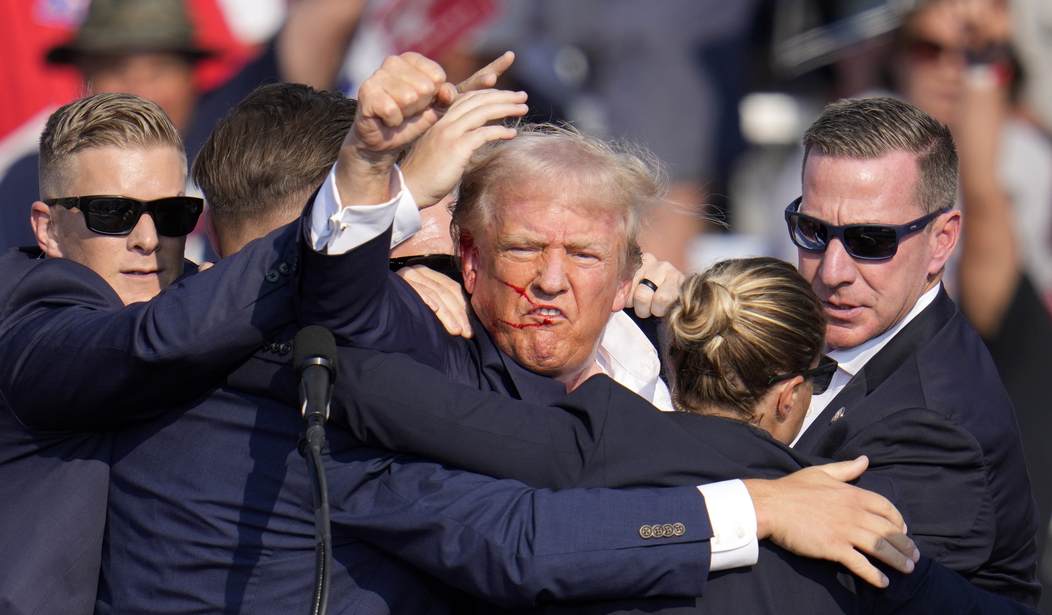Those who cannot remember the past, George Santayana warned in 1905, are condemned to repeat it. One has to wonder if nine weeks qualifies as "the past" in the context of two assassination attempts on former president Donald Trump. Even while the US Secret Service and the Department of Homeland Security remained reluctant to fully disclose their failures on July 13, another attempt on Trump has everyone wondering what went wrong this time.
We have a clearer picture of the near-past now, thanks to a whistleblower report compiled by Sen. Josh Hawley (R-MO). The report covers some details already known to the public, but reveals other points of failure not yet in the public discussion. For instance, one enduring question has been how the Secret Service could have left a rooftop less than 150 yards away from the stage unsecured in Butler, PA.
The answer? According to Hawley's sources, it was too hot for the Secret Service agents and other law-enforcement personnel:
On July 13, law enforcement personnel abandoned the rooftop of American Glass Research Building 6—the roof from which Thomas Crooks attempted to assassinate the former president—because of hot weather.
You have to be ****** kidding me. It doesn't take Von Clausewitz to understand that all high-ground positions have to be secured in order to protect a former president on a stage less than 150 yards away. The impression until now was that the failure to secure the roof was more of an oversight; now we hear that the decision was deliberate.
And was it too hot for the shooter? Apparently not.
The quality of decision-making didn't improve in the rest of the report:
• The Secret Service’s Counter Surveillance Division, which performs threat assessments of event sites, did not perform a typical evaluation of the Butler site and was not present on the day of the rally.
• Secret Service personnel declined multiple offers from a local law enforcement partner to deploy drone technology, despite the fact that the would-be assassin used a drone to survey the rally site mere hours before the attempted assassination.
• The Secret Service’s Office of Protective Operations-Manpower told agents in charge of security for the Butler rally not to request additional security resources because they would be denied. ...
• The Secret Service’s lead site agent on July 13—the agent with specific responsibility for the security of the rally site, including line-of-sight concerns—was known to be incompetent. That incompetence led to the placement of items like flags around the Butler stage and catwalk, impairing visibility.
• Supplementary Department of Homeland Security personnel were used to fill in shortages of Secret Service personnel on July 13. Some DHS agents were pulled off child exploitation cases for this purpose, and the “training” they received was merely a poor-quality, two-hour webinar.
Hoo boy. A whole two hours of training in personal protection, eh? A number of states require more than that for rent-a-guards. (Pennsylvania is a notable exception.) All of the above, if accurate, suggests a Secret Service approach to Trump's security that can best be described as half-assed. The next set of revelations confirm that impression:
In addition, Senator Hawley is revealing several new findings from whistleblowers that have not yet been reported:
• The lead agent responsible for the entire Butler visit, including the rally, failed a key examination during their federal law enforcement training to become a Secret Service agent.
• Secret Service intelligence units—teams of Secret Service agents paired with state and local law enforcement to handle reports of suspicious persons—were absent from the Butler rally.
• The hospital site where former President Trump received treatment after the shooting was poorly secured, and the hospital site agent could not answer basic questions about site security.
Hawley insists in this report that he has gotten corroboration on these points and more. In this report, Hawley again called on DHS Secretary Alejandro Mayorkas and acting USSS director Ronald Rowe to terminate those agents who made these decisions and failed to take their mission seriously.
Hawley has done this on his own. The Senate's Permanent Subcommittee on Investigations still is working through its probe of the July 13 assassination attempt, and Ron Johnson (R-WI) is none too pleased with the cooperation they're getting from the Biden administration. The Federalist's Matt Kittle adds this to the end of his review of Hawley's findings:
U.S. Sen. Ron Johnson, R-Wis., ranking member of the Senate’s Permanent Subcommittee on Investigations told The Federalist in an interview Sunday evening that he is particularly frustrated by the Secret Service’s and FBI’s failure to grant the committee overseeing these agencies access to key sources.
“FBI Deputy Director [Paul] Abbate said they’ve done over 1,000 interviews. We’ve done 12,” Johnson said. “The Secret Service hasn’t let us to talk to them. The FBI hasn’t given us one 302 [interview report]. When we get documents, they’re often the day before, and heavily redacted.”
Johnson told me he expects the investigations committee will release its preliminary report in the next couple of weeks. As the Hawley report notes, the Secret Service’s mission is to protect the president, vice president, former presidents, and other important government officials. Its annual budget is approximately $3 billion.
“Yet despite these vast resources, the Secret Service failed to protect former President Trump from a 20-year-old would-be assassin, who appears to have single-handedly outwitted the world’s most famous protective service. This level of incompetence demands an explanation,” the report states.
Indeed it does -- before we're condemned to repeat the past, again, and worse the next time around.








Join the conversation as a VIP Member